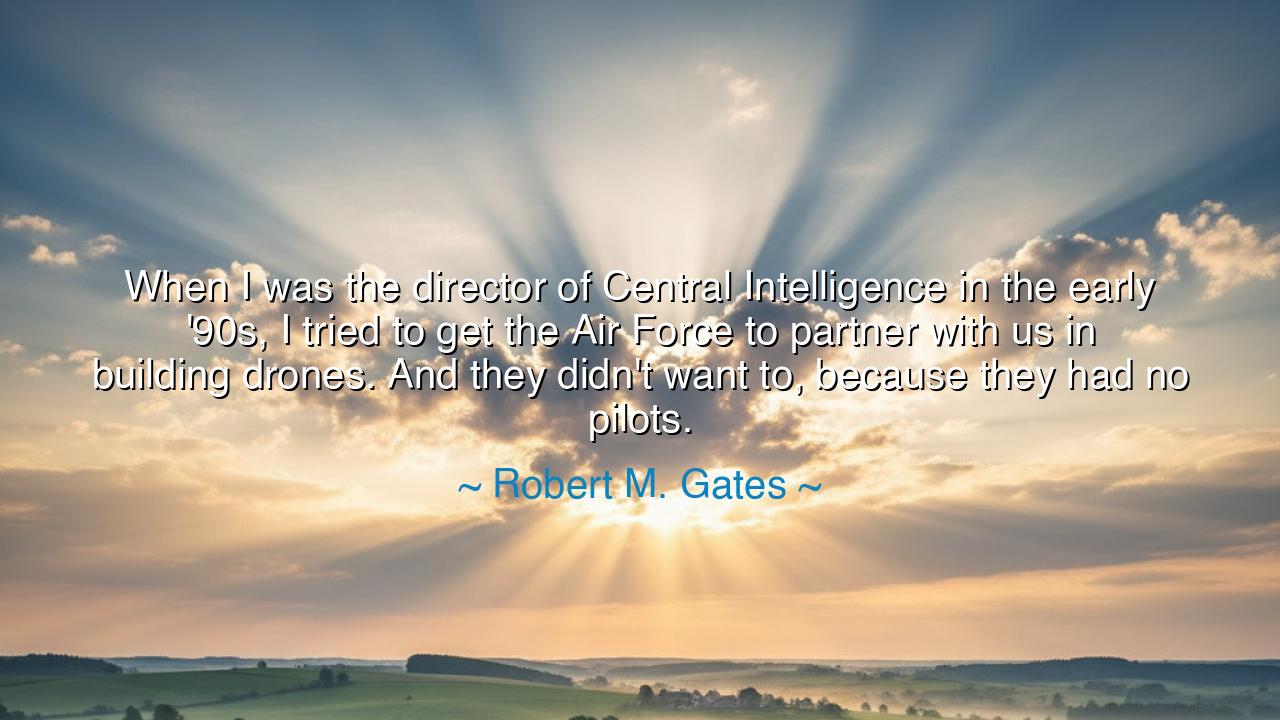
When I was the director of Central Intelligence in the early
When I was the director of Central Intelligence in the early '90s, I tried to get the Air Force to partner with us in building drones. And they didn't want to, because they had no pilots.






The words of Robert M. Gates, a man forged in the quiet fires of intelligence and statecraft, speak not merely of technology, but of the human struggle against change: “When I was the director of Central Intelligence in the early '90s, I tried to get the Air Force to partner with us in building drones. And they didn't want to, because they had no pilots.” In this reflection lies a parable as old as civilization itself—the tension between the old order and the new, between tradition and transformation. Gates, who stood at the helm of the Central Intelligence Agency, bore witness to a moment when innovation knocked upon the door of progress, and yet fear, pride, and custom barred its entry.
To understand these words, one must know their time. In the early 1990s, the world stood upon the threshold of a new era. The Cold War had ended, and the great military powers were awakening to new tools of surveillance and warfare. Among these, the idea of drones—unmanned aerial vehicles capable of flying without pilots—was still young, fragile, and strange. To the Air Force, whose identity had been built upon the valor and skill of its aviators, this notion seemed alien, even heretical. The sky, in their eyes, was a realm for heroes with wings, not for machines guided by circuits and commands. Yet Gates saw what others could not: that the future of warfare would not belong to the brave alone, but to the wise, to those who embraced the fusion of intelligence and innovation.
His lament—“they didn’t want to, because they had no pilots”—is a metaphor for the blindness that often afflicts institutions and men alike. It is the refusal to see value beyond one’s established image, the fear of losing identity in the face of evolution. The Air Force, bound to its glorious legacy, could not imagine a force without pilots, just as many in history could not imagine ships without sails, or nations without kings. Yet history moves ever onward, indifferent to the comfort of habit. The truth Gates reveals is not about drones alone, but about the cost of resistance to change, a cost measured not only in lost time, but in lost vision.
This lesson is reflected in the ancient story of Galileo, who dared to suggest that the Earth revolved around the Sun. The scholars of his age, bound by their dogmas, refused to look through his telescope. They feared not what he saw, but what his sight implied: that the old order of knowledge would crumble before the dawn of new understanding. The Air Force, in Gates’s tale, stands in that same proud lineage—guardians of greatness who mistake stability for strength. Yet the wise man, like Gates or Galileo, knows that progress demands humility—the willingness to unlearn, to question, to begin again in the light of discovery.
In the years that followed, the drone became not only real but indispensable. It transformed the art of intelligence, the nature of war, and the philosophy of surveillance. The very technology once dismissed for lacking pilots became a symbol of precision and strategic foresight. Gates’s foresight, once resisted, became prophecy fulfilled. This irony is not one of vengeance, but of vindication—the eternal reminder that innovation often arrives disguised as heresy, and that the seeds of the future are rarely planted by those too comfortable in the present.
But let us not read this tale only as a warning to institutions. It is also a mirror for the individual soul. Each of us, in our own lives, faces moments when the world offers change, and we turn away because it threatens the identity we have built. We are, like the Air Force of Gates’s story, attached to our “pilots”—the symbols and roles by which we define ourselves. Yet if we cling too tightly, we risk becoming prisoners of our own pride. The wise must learn to release the need for control, to trust that growth often requires stepping into the unknown. For as the ancients said, “The one who fears change dies before death comes.”
Therefore, O seeker of wisdom, let this teaching guide you: when new knowledge approaches, do not shut your gates in fear. When innovation challenges your comfort, listen before you reject. The world belongs not to those who cling, but to those who adapt—to the minds brave enough to see beyond the pilot’s seat and imagine what could fly without it. Gates’s story, born in the halls of intelligence, echoes across every age and every soul: progress asks for courage, not in battle, but in belief.
And so, remember this truth: the future will always belong to those who look upon the strange and the unfamiliar not with suspicion, but with curiosity. For it is only when we dare to embrace what seems impossible that we discover what is truly inevitable. In this spirit, heed the wisdom of Robert M. Gates, and learn to see the world not as it has always been, but as it is becoming—for in that vision lies both the salvation of nations and the awakening of the human spirit.






AAdministratorAdministrator
Welcome, honored guests. Please leave a comment, we will respond soon